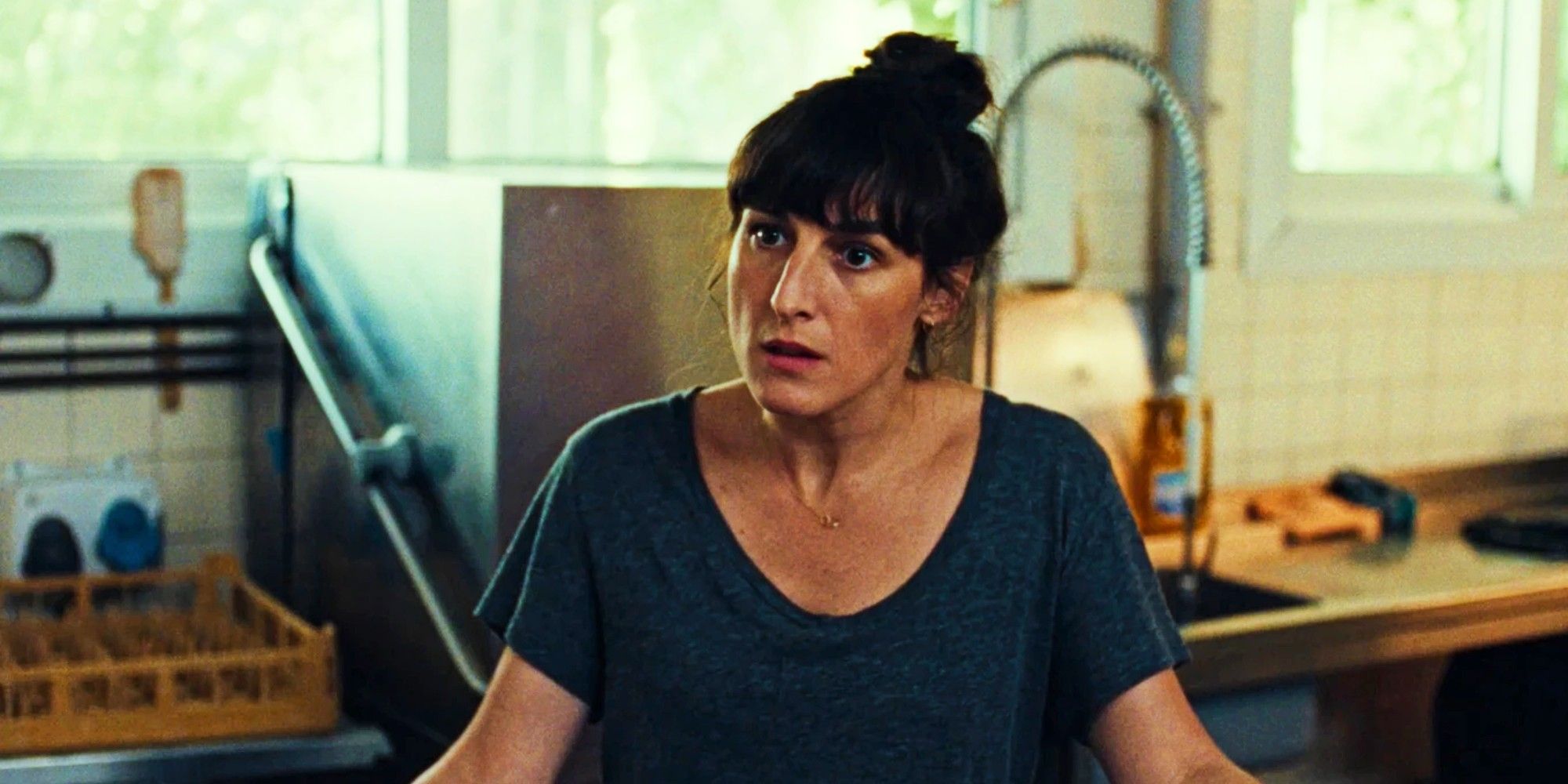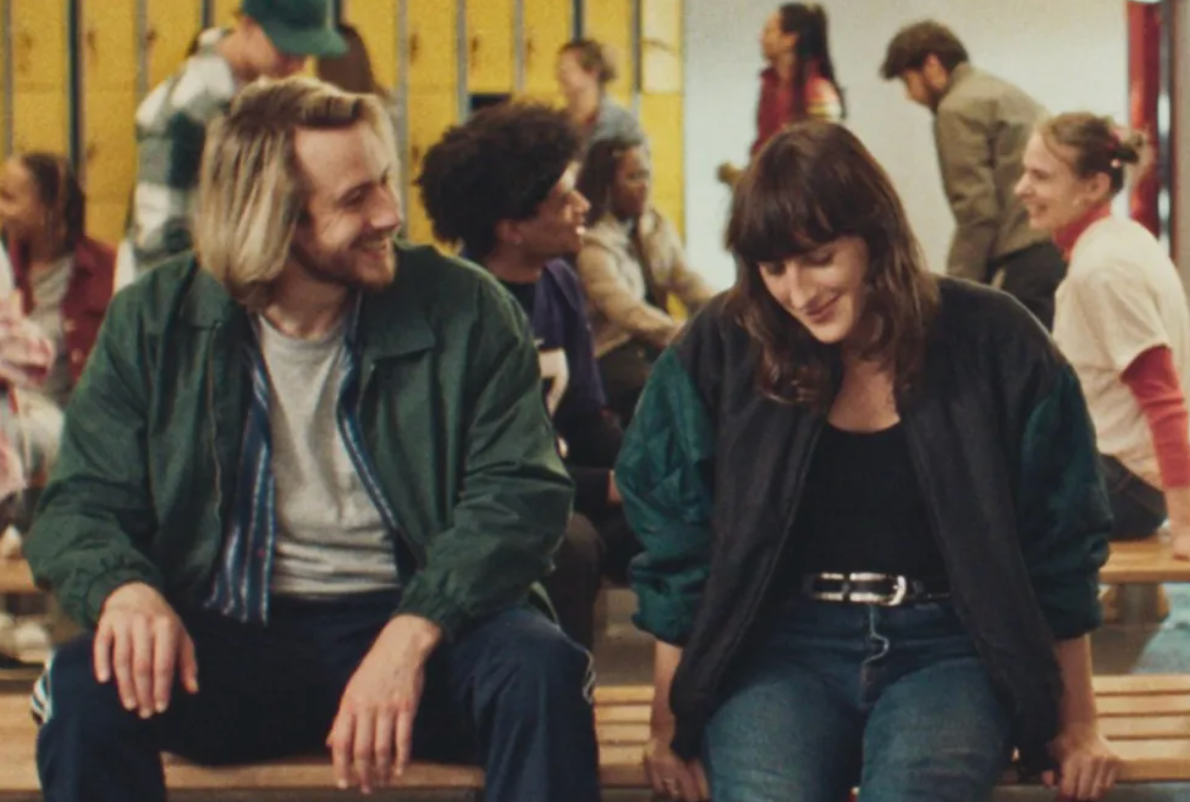Director: Amélie Bonnin
Writers: Amélie Bonnin, Dimitri Lucas
Stars: Juliette Armanet, Bastien Bouillon, Tewfik Jallab
Synopsis: A rising chef, about to open her own restaurant in Paris, must return to her hometown for a family emergency. Far from city life, her memories resurface and her certainties are shaken.
Last year, Quentin Dupieux shocked la Croisette with The Second Act as the opening film of the 2024 edition of the Cannes Film Festival. The 81-minute-long troll was one of the filmmaker’s most audacious, patience-testing moving images yet and was immediately shunned, even if many audiences who attended its world premiere missed its important message of great urgency about why human-made art is worth preserving, through a simple gesture occurring before the end credits. In an era where anti-art idiots dictate how movies should be made, and significant players are bullish on the potential of Artificial Intelligence, Dupieux asks all of us to resist and keep creating, because without it, there’s no point in society existing.
For me, these are what festivals are made for: screening films that ask their audience, who have likely traveled a long way to get to the steps of Cannes, pertinent questions on the world we live in, and, more importantly, the future of this art form. It was a bold choice for Thierry Frémaux to have premiered Dupieux’s film as the opening of the 77th annual festival, and a far better statement to make than whatever the hell Amélie Bonnin’s Leave One Day is.
An adaptation of her 2021 short film, Bye Bye, the 94-minute-long comedy opened the 78th edition and has a relatively simple premise that, in isolation, could’ve worked. Unlike the short film, which retains the basis of the story, the story focuses on its female protagonist, played by Juliette Armanet. In the short, the story was filmed in the perspective of Bastien Bouillon’s character who, after returning to the village where he grew up, rekindles with an old flame, played by Armanet.
In the film, Cécile Béguin (Armanet), an ambitious chef who, a few days before her high-end restaurant is set to open in Paris, receives the call that her father (François Rollin, reprising the same role from the short) is in the hospital due to a heart attack. Encouraged by her boyfriend, Sofiane (Tewfik Jallab), to visit her family, Cécile travels to her hometown and is surprised, when she arrives, that her dad is out of the hospital. Thinking she has nothing to worry about, Cécile immediately wants to return to Paris, away from her family life, but is convinced by her mother (Dominique Blanc) to stay for a few days, where she rekindles with the past life she wants to leave behind, almost as if she is ashamed to be a part of this family.
It’s at that point when Cécile reunites with a former lover of hers, Raphaël (Bouillon), and still has strong feelings for him, even though he has built a family with his wife and son. It’s a fairly standard scenario we’ve seen thousands of times before, and it is, for the most part, admirably shot and staged. The expected narrative beats hit the way they’re supposed to, the relationship between Cécile and Raphaël feels palpable enough for us to latch onto their reconnection, and the recurring bits of animosity Cécile has towards her family are understandable as to why she would never want to speak with her parents again.

Had Bonnin stayed in that register, the movie would’ve been a pretty decent, albeit unmemorable, time, that begs the question of why something like this would ever open such a prestigious film festival, where, usually, the best movies of any given year open to a broad audience with thunderous acclaim. However, and for an inexplicably baffling reason, Leave One Day is also a jukebox musical, with characters breaking into popular French songs at some of its most pivotal points, diluting the impact that such a serviceable movie would’ve otherwise received.
I consider myself a fan of musicals – from Vincente Minnelli’s work, West Side Story, Singin’ in the Rain, the oeuvre of Jacques Demy, to even unconventional oddities like Xanadu. The kookier, the better. Yet, in recent memory, we have had a trend of musicals that despise being so, almost as if they are ashamed of making their characters sing, such as Joker: Folie à Deux, Emilia Pérez, The End, O’Dessa, just to name a few. We can now add Leave One Day to this ever-growing list of musicals that give the genre such a bad name and are the reason why moviegoers shun them.
It’s particularly baffling, too, because, if you watch the short film, the songs, while a bit stilted, are well-integrated into the film’s diegesis and give the story a more dreamlike quality than it otherwise would have, as Bonnin captures her story with extremely grounded, almost documentary-like realism. They also aren’t overused – at just the right time, the characters will sing whenever they can’t express their feelings in words, and stop when it’s all over. It never overstays its welcome, and adds some much-needed texture to the (short) story and character work Bonnin attempts to create.
In the feature-length version, not only is there no reason for the characters to sing, except for one sequence where Raphaël and Cécile reminisce on a past love through the sounds of K-Maro’s “Femme Like U” at a figure skating rink, but most of the song covers are completely out of tune or rhythm. In film, characters usually sing because they cannot express what they want to convey through words, making their emotional plight all the more powerful when paired with an expressive language that shows, more than any genre, why moviemaking may be the most powerful art form ever created.

However, apart from that aforementioned scene, most of the emotional beats that are expressed in Leave One Day can be done so through words. I understand that Bonnin wants her film to set itself apart from the rest of the “Fractured Family Drama” compendium, but it negates most of the otherwise solid character development and turns this movie into something more akin to a torture device than the affecting journey Cécile should theoretically take.
It also doesn’t help that most of the plotlines introduced in the movie, whether Cécile’s relationship with Sofiane, or Cécile’s pregnancy, a major aspect of her character, get dropped entirely and/or forgotten by the time we reach the final scene, causing this exercise in jukebox musicality (included in this package are Karaoke-styled opening and ending credits) to feel incomplete rather than the fulfilling and life-affirming picture Bonnin thinks it is.
Armanet and Bouillon do have more time to work on their characters than when they worked with Bonnin on Bye Bye, but the short film is so much better than its feature adaptation, which is usually never the case. That said, the sole decision of making both protagonists sing in the feature when they truly shouldn’t completely tarnishes any impact the movie could’ve had, if Bonnin had thought of executing this simple story admirably. Instead, she decides to clumsily insert covers of French music classics, from Dalida and Francis Cabrel to Stromae, into the mix, which will make you want to leave the cinema as soon as Cécile begins to sing “Alors on Danse” at the top of the movie. And it doesn’t get any better from there.






